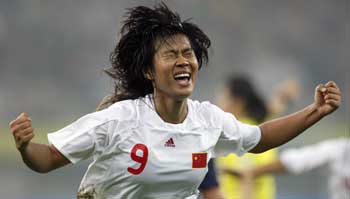Basketball star Yao Ming carried the Olympic torch through Tiananmen Square today in the triumphant final leg of a relay fraught with protest. His long-legged saunter under the gaze of Mao’s portrait captured headlines in today’s Web news outlets, along with speculation about who will light the torch at the opening ceremony of the Games on Friday.
Also in the news was the start of Olympic competition in Tianjin, which brought an auspicious win. The Chinese women’s soccer team beat Sweden 2-1.
With daily newspapers full of the kind of reporting you might expect from any host nation during the Games, a thoughtful Guangzhou-based magazine takes a step back to consider the sentiment behind it all.
“Chinese Nationalism in the Olympic Year” is the title of an essay that examines what happened before and since the excitement of July 13, 2001, when Beijing won its bid for the Olympics.
At that time, writes Zhao Lingmin, the Olympics was seen by many Chinese people as not only a sporting competition but as “a symbol of China’s rise”:
It was the optimal window for showing the world the achievements of 30 years of China’s reform and opening up. It was a golden moment for attracting spectators from all over the world to enter China, understand China and accept China. It was also an optimal chance for China to go toward the world, attract the world and join the world.
This year, Zhao writes, Western criticism over China’s role in Darfur, the departure of Steven Spielberg as artistic advisor for the opening ceremony, riots in Tibet, and protests directed at the torch relay have put a dent in many Chinese people’s dream of an ideal global community.
Zhao notes that the Western media is flawed and some protesters are unreasonable, but writes that the reaction of an intense expression of Chinese nationalism is disturbing, even to some Chinese. Is this the stance that a rising power should adopt toward the world?
The essay argues against extreme nationalism, but makes a prediction: Authorities will take every kind of security measure to make sure that Chinese nationalist sentiment–toward French or Japanese athletes, or CNN reporters, for instance–does not disturb the Olympic Games.
“But that is not to say that extreme nationalism has been tamed,” writes Zhao. “Its power has only been temporarily caged.”
